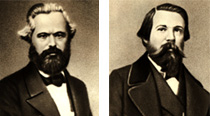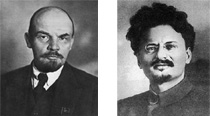The article below may be copied and circulated but proper attribution of authorship is required.
French Stalinists again rescue the capitalist system.
Copyright: Iskra Research, by F. Kreisel, June 6, 1997.
Yesterday's (June 5, 1997) top editorial in the London Financial Times, the major daily newspaper of international big business, is of such vital interest to the world proletariat that it must be reproduced in full. This newspaper costs $1.50 an issue and its intended audience consists of capitalists and bourgeois managers around the world. It is all the more important for workers to know the thinking of this exclusive group.
The editorial deals with the aftermath of the French parliamentary elections which gave an overwhelming majority to the coalition of the Socialists, Communists and ecologists. Final results showed the Socialists won 273 seats in the 577-seat National Assembly, the Communists, 38 seats, and the ecologists, seven. The former governing coalition of the center-right won only 257 seats, the fascist National Front won one seat.
So, here it goes:
Better in than out.
The inclusion of Communists in the new French cabinet is not such bad news as it sounds. Mr. Lionel Jospin had either to bring them in or to negotiate terms on which they would support him from outside — a formula which has not proved too comfortable for his Italian counterpart, Mr. Romano Prodi.
Mr. Jospin does not appear to have given any new policy commitments to get the Communists in. Nor will their voices in cabinet be a determining influence on general policy. But their party, having joined the government is condemned to try and make a success of in. It will have to phrase any criticisms in a constructive, more-in-sorrow-than-in-anger style.
Of course, with a Communist transport minister Mr. Jospin is unlikely to privatize the French railways (SNCF). But the fact is that his own party was never going to do this anyway. On the other hand, the minister, Mr. Jean-Claud Gayssot, will have a strong interest in proving that the SNCF can provide an efficient and competitive service within the public sector. If he concludes (as well he might) that this requires lay-offs and new working practices, he is uniquely qualified, as a former railway man and official of the Communist-controlled CGT trade union, to push them through without major strikes.
In fact the Communist party in France has always had a dual role. In opposition, it acts as spokesman for the victims of economic change. In government it imposes discipline on the labor movement and delivers working-class acceptance of unpleasant economic realities. "One must know how to end a strike", declared its leader Maurice Thorez in 1936.
There may be a broader point here. Right-wing French governments which attempt economic reform provoke fierce and widespread popular resistance, as Mr. Alain Juppe could testify. Left-wing governments, by contrast, can sometimes win grudging acceptance for necessary reforms. It was under Francois Mitterrand that France kicked its inflation habit and adapted to the European single market.
Mr. Jospin and his team arrive in power burdened with much left-wing rhetoric but sensibly few hard-edged commitments. Their rashest campaign promise, to create 700,000 new jobs, cannot be honored directly by the state. But it could be surpassed by private employers if the state made job creation less risky and less costly.
Such policies are known in France as "ultra-liberal" and, when attempted by a right-wing government, are liable to provoke a general strike. But a Socialist government, with the Communists on board, might just get away with them
Editor of the Financial Times
Our comment:
We must bear in mind the economic and social conditions prevailing in Western Europe today. European capitalism is facing extremely difficult competitive pressures from its American, Japanese, Korean and other rivals. Major European companies are making losses instead of profits. The recent announcement by the banks financing the latest and greatest of engineering ventures of European capitalism, the rail tunnel under the English Channel, that this multibillion dollar operation will remain in the red at least through 2006 is but one shocking reminder of this fact. Companies like Renault, Phillips and Volkswagen are desperate to cut their production costs, embark on wholesale lay-offs and rationalizations.
Unemployment in Western Europe is already at levels not seen since the Great Depression of the 1930's. In France over three million workers are out of work and the unemployment rate stands at 12.8%. At the same time, the workers of France, Germany and other countries have shown that they are ready to fight in defense of the substantial networks of social protection won by them in hard struggles of the post World War II period. The huge general strikes in France a year and a half ago dealt a blow to the initial attempt of the French bourgeoisie to impose the required austerity program on the French people, and brought about the present electoral debacle of the right.
But it would be fatally wrong to view this election as a lasting victory for the working class. The Common Market decision of a decade ago to integrate the national economies of Western Europe was a response to the globalization of world production and the intensification of competition among the major capitalist economies. Western European capitalists had to achieve the economies of scale and the tactical mobility which were enjoyed by their major competitors. The Maastricht criteria for this integration and unification were designed as yardsticks to measure the disparate forces acting inside the national components of the future European capitalist juggernaut. The idea was make these national units more alike in their inflation rates, deficit spending and debt levels so they could be tied together into one economic whole.
Today these criteria are being used as a political stick to beat the European workers into submission, just like the slogan of a balanced budget is being used in the United States.
The so-called workers' parties in France stand before a dilemma: what to do now that they are in power. The demands of capitalist competition require drastic cuts in unemployment compensation, pensions, paid vacations and holidays, cuts of child support, student educational grants, privatization and mass layoffs in state owned industries and government service, etc. In fact, considering that French workers' living standards are much higher than those of workers in some of the poorer countries within the ECU — like Spain, Greece or Portugal — even very drastic cuts will not stop the movement of French industry out of France to cheaper locations elsewhere. When organizing production a European capitalist today is not even limited to Europe, and multinationals like Phillips or Renault can move their factories to Mexico, the Czech republic or China just as easily. Considering this fact of globalized production, to make the French workers competitive on the world labor market the bourgeoisie has to impose truly draconian conditions of existence on the French working class.
But the workers have just won an electoral victory?!
Jospin and his "Communist" and "Green" colleagues will have to do just the opposite of what their enthusiastic voters expect of them: drive wage rates down, make firing workers easier, lower the pollution costs of the French industry, shut down health and educational services for the poor, and so on. To achieve this they must split the working class into mutually hostile groups and set the various sections of workers against one another. Thus, they are adopting the chauvinist slogans of the fascist Nationalist Front, calling for fresh restrictions on immigrants, Moslems and dark skinned residents of France. In addition, they will play the young against the old, women against men, intellectuals against blue collar workers.
As the editor of the "Financial Times" reminds us, in 1936 the French Communist Party prevented and derailed the French communist revolution. After Leon Blum, the "Socialist" leader, and Maurice Thorez, the head of the "Communists", dashed to bits the socialist hopes of French workers, the road was opened for the collapse of the Third Republic in the military onslaught of German fascism, and for the establishment of the fascist Vichy regime. The Financial Times knows perfectly well that these "Socialists" and "Communists" have been and continue to be the vital props of the French bourgeoisie, its ultimate safety valve. However, a regime of such "socialist" safety valves is no longer sufficient; real fascist conditions must be imposed to make capitalism profitable again.
The danger for the French and European working class is that the "left" governments in Italy, France, Great Britain and elsewhere will dispirit and demoralize the workers by their inaction regarding their electoral promises, and pro market actions in reality. We see this happening already: Jospin and his "Socialist" and "Communist" colleagues are traitorously working to break the spirit of the workers, diffuse their militancy, weaken their organizations, and thus, open the way for fascism in France.




